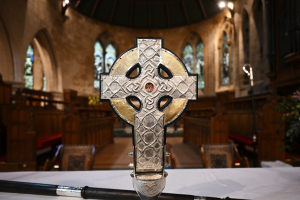Lessons from Esther: A Mother’s Day reflection
What strange times we are living in! We will be celebrating Mother’s Day in America on Sunday in the midst of the Covid-19 pandemic. This Mother’s Day will certainly be unlike any other.

As I prepare to honor my wife, Deb, who is a wonderful mother and grandmother, I’ve been thinking about the book of Esther. It tells the story of an unlikely heroine who was living in unlikely times. An orphaned Jewish girl, Esther, becomes queen and saves her people from death at the hands of Haman, a vicious advisor to the powerful King Ahasuerus of Susa.
Scripture says Esther was raised “for such a time as this.” Her story is especially encouraging in these uncertain days when we are tempted to give up.
Here are three things we can learn from Esther:
1. God is watching over his people.
The name of God is never mentioned in the book of Esther, but his presence is obvious. Though Esther suffered the loss of her parents at a young age and was separated from her beloved uncle, Moredecai, when she was forced into the King Ahasuerus’s harem, God protected her. Her hardship was her path to queenship.
God’s working in Esther’s life evidences a God who watches over his people. The Jews are God’s chosen people, and they have been persecuted throughout history. Haman was the number one enemy of the Jews in Susa. His hatred for them was so consuming that he asked King Ahasauerus for permission to rid the kingdom of “a certain people” who didn’t obey the king’s laws (Esther 3:8-9)
When it was decreed that the Jews were to be annihilated, “there was great mourning among the Jews, with fasting and weeping and lamenting, and many of them lay in sackcloth and ashes” (Esther 4:3). I can only imagine how those men, women and children felt. Perhaps they wondered if God had forsaken them or if he would deliver them.
Our present time is one of great sadness. Millions of people all over the world have been sickened by COVID-19 and hundreds of thousands have lost their lives to the virus. Many of us have had our lives completely turned upside down by the disease. We wonder if God cares and if he is going to intervene.
As we learn at the end of Esther’s story, Haman was destroyed by his own hatred and the Jews were saved (Esther 7:7-10). God was working behind the scenes the whole time to deliver his people. He is at work in the midst of our suffering, even if we can’t see it.
2. When confronted with adversity, we can choose fear or we can choose faith.
When Mordecai informed Esther of Haman’s plot against the Jews and asked her to speak to the king, she was afraid. The price of appearing before the king unsummoned was death. But Mordecai urged her, “...who knows whether you have not come to the kingdom for such a time as this?” (Esther 4:14 ESV).
Esther had a choice. She could focus on her fears and try to save herself or she could choose faith and try to save her people. Though her heart was surely pounding at the thought of confronting the king, she committed herself to three days of prayer and fasting and then went before him (Esther 4:15-17; 5:1-7).
As we grapple with the reality of COVID-19, we feel fear. Our future looks uncertain. We can choose to live in fear or we can look our fear in the face and choose to respond with faith. God wants to work in and through our lives as we place our faith in him, trusting him for the outcome.
3. God honors our sacrifice of obedience.
Esther’s decision to speak to the king was an act of radical obedience. She was prepared to sacrifice herself if it meant saving her people from genocide: “If I perish, I perish” (Esther 4:16).
Throughout Scripture, we see that God calls his people to sacrificial obedience and that he rewards them for it. The greatest example of this is in the life of our Lord and Savior, Jesus. The Son of God sacrificed himself on the cross out of obedience to his Father and he was rewarded with life and “the keys to Death and Hades” (Revelation 1:18).
God is calling us to a sacrifice of obedience. He is asking us to surrender our plans, dreams and lives to him. I want to specifically applaud the women who are working tirelessly to care for their families and friends as they navigate working from home or the loss of work. I know many of you have been stretched to the breaking point. But God has appointed you for this time. Your love and your example to your children and others is truly invaluable and more impactful than you may ever know.
We can take comfort in Esther’s story because it reminds us that when it seems like God has disappeared from our lives, we can rest assured that he hasn’t.
Dr. Jack Graham is the pastor of Prestonwood Baptist Church, one of the largest and fastest-growing churches in America. He is also a noted author, and his PowerPoint Ministries broadcasts are available in 92 countries and are heard daily in more than 740 cities. Follow him @jackngraham.




























